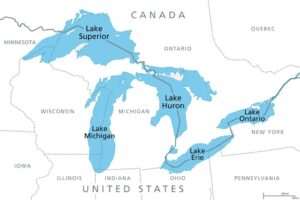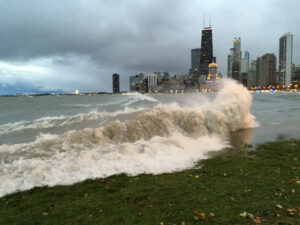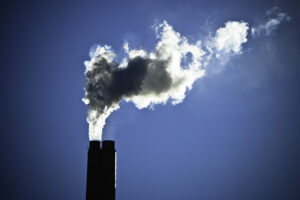July 24, 2025
Climate Change is Seriously Jeopardizing the Great Lakes
New ELPC report by leading Midwest scientists shows how climate change is causing more real-world threats to our region’s economy and environment.
By Howard A. Learner, Chief Executive Officer & Executive Director

The Great Lakes
The Great Lakes is where we live, work, and play. The lakes are a diverse, robust ecosystem and provide outdoor recreation opportunities enjoyed by millions of people, supply safe drinking water to 40 million people, and support the region’s vital economic vitality. All of that is at risk, however, as climate change impacts threaten our region.
ELPC’s new 2025 Great Lakes – Climate Change Impacts Report by a team of Big 10 University scientists updates their comprehensive 2019 report and explains the effects of Midwest temperatures rising even faster than expected over the past six years. This new report warns of dangers to the Great Lakes and our regional economy, and the impacts on water quality, health, infrastructure, agriculture and tourism.
We are in unprecedented times: facing a federal government that is undoing critical protections, exacerbating climate pollution, and attacking sound science – even the essential and nonpartisan National Weather Service! Let’s keep lifting up sound science to inform policymaking and help build resilient communities that can withstand the challenges ahead. ELPC is meeting the moment. We’re standing up. We’re fighting back and making a difference.
What’s in the Report?

High waves in Lake Michigan along the Chicago shoreline. Credit: L.S. Gerstner (Chicago).
The scientists’ report explains how more extreme weather impacts Great Lakes water levels and shoreline infrastructure, harms ecological health, and puts constraints on outdoor recreational enjoyment and our economy. Don Wuebbles, the Harry E. Preble Professor of Atmospheric Science at the University of Illinois and former Assistant Director of the Office of Science and Technology Policy under President Obama, oversaw the study and served as lead author.
What We’re Seeing:
- Record-low winter ice cover on the Great Lakes: 2024 recorded the lowest average winter ice cover on record for the Great Lakes (only 4.3% average). Less ice disrupts ecosystems, worsens shoreline erosion, and hurts tourism and fishing economies.
-

Blue Green Algae in a Michigan lake
Rising toxic algal blooms — even in Lake Superior: The significant rise in industrial agricultural runoff and warming lakes are causing toxic algal blooms, especially in Lake Erie and other shallow water bays across the Great Lakes.
- Fish species like whitefish being threatened: Whitefish could disappear from parts of Lake Michigan within five years. Invasive mussels and warming waters are decimating food sources and spawning conditions.
- Dangerous heat waves strain infrastructure and public health: Chicago (and other urban areas) may experience over 200 hours above 95°F by the 2030s, up from just 30 hours in recent years. Since 1951, annual average air temperatures have increased by 2.9°F in the U.S. Great Lakes region (GLISA 2025).
What Can We Do About It?
 The Trump Administration’s failure to recognize sound science and climate realities is unacceptable and dangerous for the Midwest and the planet. We need to act now to advance positive renewable energy development, clean transportation, and agricultural pollution reduction solutions to protect our lakes from severe consequences for public health, land use, and economies in our Great Lakes region.
The Trump Administration’s failure to recognize sound science and climate realities is unacceptable and dangerous for the Midwest and the planet. We need to act now to advance positive renewable energy development, clean transportation, and agricultural pollution reduction solutions to protect our lakes from severe consequences for public health, land use, and economies in our Great Lakes region.
ELPC is playing defense at the federal level:
- To stop mercury pollution from old coal plants in Illinois and North Dakota.
- To protect wetlands in Illinois, Iowa, Minnesota and the Dakotas.
- To clean up Lake Erie by reducing manure pollution that causes toxic algae outbreaks every summer.
And we’re playing offense at the state and local level to advance climate solutions:
-

CTA Blue Line Train
To improve public transportation and passenger rail service.
- To build out affordable renewable energy, resulting in less pollution, more good jobs and less energy wasted.
- To protect the Great Lakes and communities from shoreline hazards like the U.S. Army Corps of Engineers’ misguided proposed toxic dredged waste landfill along the Lake Michigan shoreline in Chicago’s Southeast Side community, which has long been over-burdened by toxic pollution.
ELPC has been an environmental leader in the Midwest for over 30 years. The Midwest and the Great Lakes are ELPC’s home. Our region is vital to climate action progress because we’re the hub of our nation’s transportation system and a very large energy market.
ELPC is meeting the moment. We had our post-election Plan A and Plan B strategic plans ready to go after the November 2024 election, and we’re moving forward play both defense at the federal level and offense in the Midwest states, which truly can be “laboratories of democracy,” as Justice Louis Brandeis famously explained. ELPC is staffing up to strengthen our talented staff with new 10 new talented attorneys and policy advocates. We are meeting the moment with more capacity to do what’s necessary and important.
Take Action
Help us protect the Great Lakes & communities! We have two ways you can take action now. Sending a letter to your Congressperson telling them to protect clean water and/or submit a public comment to the EPA docket telling them to keep strong rules on power plant pollution.
Take Action to Fight Climate Pollution
And support ELPC to continue making a significant impact and producing strong results during these extraordinary times. During our summer match, your donation will be doubled up to $30,000, so now is a great time to give!

